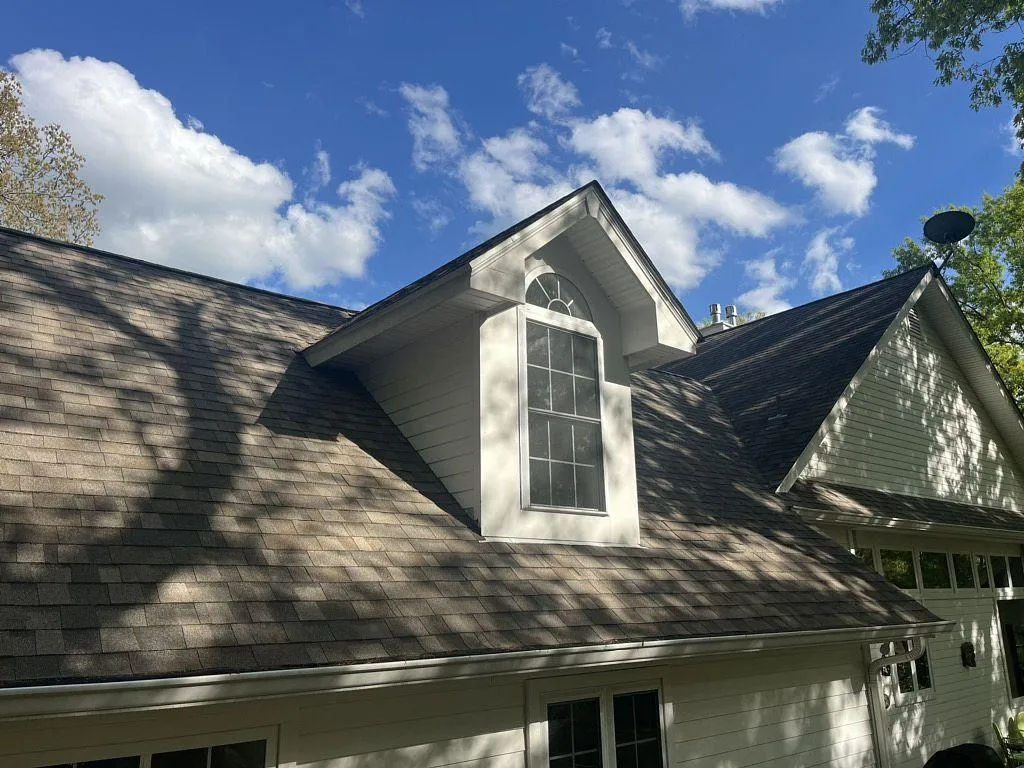Our Learning Center

Budgeting for Your Rooftop: How Much Should You Expect to Spend on a New Roof?
If you're considering a new roof for your home, you're likely brimming with questions. Chief among them: How much will it cost? Understanding the financial investment required for a new roof is crucial for effective budgeting and planning. In this guide, we'll delve into the factors influencing the cost of a new roof and provide insights to help you prepare financially for this significant home improvement project.
1. Roofing Material: One of the most significant factors influencing the cost of a new roof is the type of material you choose. Asphalt shingles, metal, tile, and slate are among the most common options, each with its own price point. Asphalt shingles are generally the most affordable, while materials like slate and tile tend to be more expensive due to their durability and aesthetic appeal.
2. Roof Size and Complexity: The size and complexity of your roof play a major role in determining the overall cost of replacement. A larger roof will naturally require more materials and labor, increasing the total expense. Additionally, factors such as roof pitch, the number of peaks and valleys, and the presence of skylights or chimneys can add complexity to the installation process, potentially driving up costs.
3. Labor Costs: The cost of labor for installing a new roof can vary depending on factors such as location, contractor expertise, and market demand. It's essential to obtain multiple quotes from reputable roofing contractors to ensure you're getting a fair price for the work required. Keep in mind that while opting for the lowest bid may seem appealing, it's crucial to prioritize quality and reliability to avoid potential issues down the road.
4. Removal of Existing Roof: In most cases, the existing roof will need to be removed before the new one can be installed. The cost of roof removal can vary depending on factors such as the type of material being removed, the number of layers present, and accessibility to the roof. Be sure to factor in the cost of disposal when budgeting for your new roof.
5. Additional Features and Upgrades: Depending on your preferences and needs, you may choose to incorporate additional features or upgrades into your new roof. These could include enhanced insulation, ventilation systems, or energy-efficient materials. While these upgrades can increase the initial cost of your roof, they may offer long-term savings through improved energy efficiency and reduced maintenance requirements.
So, How Much Does a New Roof Cost?
While it's difficult to provide a one-size-fits-all answer to this question, the national average cost for a new roof typically ranges from 5,000to15,000 or more. However, it's essential to remember that this is just a rough estimate, and the actual cost can vary significantly based on the factors mentioned above.
To get a more accurate idea of how much your new roof will cost, we recommend reaching out to several roofing contractors in your area for detailed quotes. Be sure to ask about the specific materials, labor, and any additional fees involved in the project.
The cost of roof replacement can vary significantly across the United States due to differences in regional labor costs, material prices, and other factors. However, here are some general estimates for the average cost of roof replacement in the USA:
Asphalt Shingle Roof Replacement:
Average cost range:
4,000−
4,000−10,000 for a typical single-family home
The cost mainly depends on the size of the roof, the pitch (slope), and the quality of shingles used.
Metal Roof Replacement:
Average cost range:
10,000−
10,000−24,000 for a typical single-family home
Metal roofs are more expensive due to the materials and specialized installation required.
Tile Roof Replacement:
Average cost range:
15,000−
15,000−30,000 for a typical single-family home
Tile roofs are among the most expensive due to the weight and complexity of installation.
Slate Roof Replacement:
Average cost range:
20,000−
20,000−50,000 for a typical single-family home
Slate is a premium roofing material and requires specialized installation, making it costly.
Flat Roof Replacement:
Average cost range:
4,000−
4,000−12,000 for a typical single-family home
Flat roofs are generally less expensive than pitched roofs, but the cost depends on the roofing material used (e.g., EPDM, TPO, PVC)
Why Homeowners Resist Investing in New Roofs
There are several psychological factors that may contribute to homeowners being hesitant to invest in roof replacement:
Perceived Cost: One of the primary reasons homeowners may hesitate to invest in roof replacement is the perceived high cost of the project. They may worry about the financial burden of such a significant expense, especially if they are on a tight budget or have other competing financial priorities.
Procrastination: Some homeowners may procrastinate on roof replacement due to a psychological phenomenon known as procrastination bias. They may underestimate the urgency of the issue or convince themselves that they can delay the replacement until a later date, leading to further procrastination and potential neglect of their roof's maintenance needs.
Fear of Disruption: The prospect of a major home improvement project like roof replacement can be daunting for some homeowners, especially if they anticipate significant disruption to their daily lives during the construction process. They may worry about noise, dust, and inconvenience, which can lead to reluctance to move forward with the project.
Decision Paralysis: Decision paralysis occurs when individuals feel overwhelmed by the multitude of choices and decisions involved in a complex task like roof replacement. Homeowners may struggle to navigate the various options for roofing materials, contractors, and financing, leading to indecision and inaction.
Risk Aversion: Some homeowners may be inherently risk-averse and reluctant to take on the perceived risks associated with roof replacement. They may fear making the wrong decision or experiencing unforeseen complications during the project, leading them to avoid taking action altogether.
Consequences of Delaying Roof Replacement:
Increased Damage: Delaying roof replacement can allow existing issues to worsen over time, potentially leading to more extensive damage to the roof structure, insulation, and interior of the home. This can result in costly repairs and decreased property value.
Safety Concerns: A compromised roof can pose safety risks to occupants of the home, especially during severe weather events. Leaks, structural weakness, and other issues can increase the risk of accidents and injuries, putting the safety and well-being of the homeowners at risk.
Higher Energy Costs: An old or damaged roof may lack proper insulation and ventilation, leading to energy inefficiency and higher utility bills. Delaying roof replacement can prolong these inefficiencies, resulting in increased energy costs over time.
Decreased Property Value: A worn-out or damaged roof can detract from the curb appeal and overall value of the home. Potential buyers may be deterred by the need for immediate roof replacement, leading to longer listing times and lower offers when selling the property.
While there may be psychological barriers that prevent homeowners from investing in roof replacement, it's essential to consider the potential consequences of delaying this critical maintenance task. By addressing these barriers and prioritizing the health and integrity of their roof, homeowners can avoid costly repairs, ensure the safety of their property, and preserve its long-term value.
Replacing your roof is a significant investment that requires careful consideration and budgeting. The overall cost can vary substantially depending on factors such as the size and complexity of your roof, the materials you choose, labor rates in your area, and any additional components or work required.
If you're unsure about budgeting for this major expense, the experienced team at Infinity Roofing is ready to assist. Their knowledgeable professionals can provide a detailed assessment, answer all your questions, and ensure you understand the full scope and costs involved in your roof replacement. With Infinity Roofing as your trusted partner, you can have peace of mind knowing your new roof will be a smart, long-lasting investment in your home.
Contact us through:
+1 678-903-3170
How can we help you today?
Our family is standing by to help yours.







